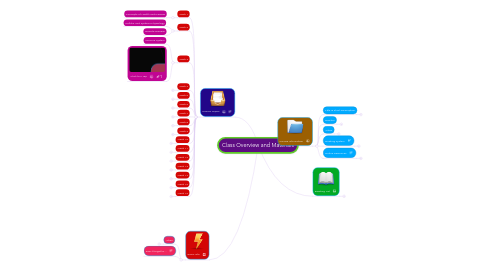
1. Course Topics
1.1. Week 1
1.1.1. Concepts of Health and Disease
1.2. Week 2
1.2.1. Cellular and Systems Physiology
1.2.2. Genetic Disease
1.3. Week 3
1.3.1. Immune System
1.3.2. Click for Map
1.4. Week 4
1.4.1. Hematology
1.5. Week 5
1.5.1. Neoplasia
1.5.2. Nervous System
1.6. Week 6
1.6.1. Nervous System (continued)
1.6.2. Cardiovascular System
1.7. Week 7
1.7.1. Cardiovascular System (continued)
1.8. Week 8
1.8.1. Respiratory System
1.9. Week 9
1.9.1. Musculoskeletal System
1.10. Week 10
1.10.1. Muskuloskeletal System (continued)
1.10.2. Monday lecture, 8-9:50
1.10.3. Liver
1.11. Week 11
1.11.1. Gastrointesitinal System and Exocrine Pancreas
1.11.2. Endocrine Pancreas and Diabetes
1.12. Week 12
1.12.1. Integumentary System
1.13. Week 13
1.13.1. Parathyroid Gland; Calcium and Phosphorous Metabolism
1.13.2. Endocrine System: Hypothalamus and Pituitary
1.14. Week 14
1.14.1. Endocrine System: Thyroid and Adrenal Gland
1.15. Week 15
1.15.1. Renal System
1.15.2. Thanksgiving
1.16. Week 16
1.16.1. Acid-Base Balance
1.16.2. Lymphatic System
2. Exam Info
2.1. When
2.1.1. Exam 1: 9/17; 8-9:50
2.1.2. Exam 2: 10/15; 8-9:50
2.1.3. Exam 3: 11/9; 8-9:50
2.1.4. Exam 4 (Final): TBH
2.2. Don't forget to...
3. Course Information
3.1. Title & Short Description
3.1.1. Pathophysiology (AHPT 8407)
3.1.2. This course provides a survey of clinical pathophysiology and covers key concepts related to the function and biological control of cells, tissues, organs, and body systems as well as structural and functional changes in cells, tissues and organs that underlie human disease. Basic principles of pathophysiology are addressed with focus on the cause, development, progress, and consequences of diseases related to the nervous, musculoskeletal, cardiorespiratory, immune, endocrine, gastrointestinal and other body systems
3.2. Teacher
3.2.1. Instructor / Course coordinator: Steven Sawyer, PT, Ph.D. Department of Rehabilitation Sciences, Doctor of Physical Therapy program, TTUHSC Office: 2B-132 (Lubbock campus) Phone: (806) 743-3235 E-mail: steven.sawyer@ttuhsc.edu Out-of-class contact with instructor: Office hours will be 3 p.m. to 4 p.m. on Fridays, or by prior arrangement. It is preferred that out-of-class questions of general interest be asked in the discussion section of Sakai.
3.2.2. Guest Lecturers:
3.2.2.1. Tammy Carter, PhD, Assistant Professor Clinical Laboratory Sciences program email: tammy.carter@ttuhsc.edu
3.2.2.2. Kerry Gilbert, PT, PhD, Program Director and Associate Professor, Doctor of Physical Therapy program email: kerry.gilbert@ttuhsc.edu
3.2.2.3. Joel Hubbard, PhD, Associate Professor Clinical Laboratory Sciences program email: joel.hubbard@ttuhsc.edu
3.2.2.4. Neeraj Kumar, PT PhD, Assistant Professor, Doctor of Physical Therapy program email: neeraj.kumar@ttuhsc.edu
3.2.2.5. Kate Panasci, DPT, Assistant Professor, Doctor of Physical Therapy program email: kathryn.panasci@ttuhsc.edu
3.2.2.6. Barbara Sawyer, PhD, Professor, Clinical Laboratory Sciences program email: barbara.sawyer@ttuhsc.edu
3.2.2.7. Megan Taylor, OTR, Assistant Professor, Master of Occupational Therapy program email: megan.r.taylor@ttuhsc.edu
3.3. When
3.3.1. Tuesdays 10-11:50
3.3.2. Wednesdays 9-10:50
3.4. Grading System
3.4.1. Exam 1: 25%
3.4.2. Exam 2: 25%
3.4.3. Exam 3: 25%
3.4.4. Exam 3: 25%
3.5. Online Resources
3.5.1. E-learning
3.5.2. Student forum
4. Reading List
4.1. Primary literature
4.1.1. Pathophysiology of Disease: An Introduction to Clinical Medicine by Gary D. Hammer and Stephen J. McPhee. 2014, 7th Edition. McGraw Hill/Lange. ISBN-13: 978-0071806008
4.1.2. Ganong's Review of Medical Physiology by Kim E. Barrett, Susan M. Barman, Scott Boitano and Heddwen Brooks. 2012, 24th Edition. McGraw Hill/Lange. ISBN-13: 978-0071780032
4.1.3. Both are available free through the library's online catalog
4.2. Secondary literature
4.2.1. Recommended: Pathology: Implications for the Physical Therapist by Catherine C. Goodman and Kenda S. Fuller, 2014, 4th edition. Saunders/Elsevier. ISBN-13: 978-1455745913

